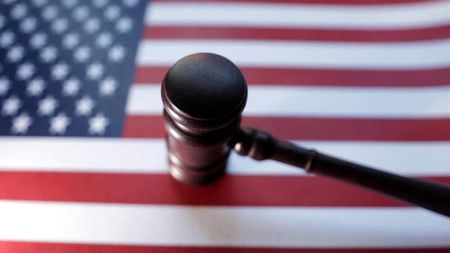By Jack Queen
NEW YORK (Reuters) – When prospective New York City jurors gather for Donald Trump’s hush money criminal trial on Monday, it may be tough to find ones who don’t have an opinion about the brash businessman-turned-politician who began building his real estate empire in Manhattan decades ago.
They will be questioned by lawyers for the Republican presidential candidate and the state of New York seeking to uncover biases and possible political agendas before impaneling 12 jurors to hear what could be the only criminal case Trump faces before the November U.S. election.
“There is almost nobody in New York who doesn’t have an opinion about Donald Trump,” said trial lawyer Paul Applebaum, who is not involved in the case. “A lot of people think he’s either Satan incarnate or the second coming of Jesus.”
But even if Trump is a polarizing figure and Manhattan is a Democratic stronghold, having an opinion will not be enough to disqualify a potential juror. Justice Juan Merchan, overseeing the case, has indicated he will not disqualify people based solely on whether they lean Republican or Democratic.
“Political orientation is not necessarily a cause for bias,” said jury consultant Melissa Gomez of IMS Legal Strategies. “But if it’s so strong that the person will be motivated to convict, that’s a problem.”
At a press conference on Friday, Trump was asked about the start of his trial.
“Jury selection is largely luck. It depends who you get,” he said.
The criminal case is one of four Trump faces and the first ever for a past or present U.S. president. While a conviction would not bar Trump from retaking office should he defeat Democratic President Joe Biden, a Reuters/Ipsos poll this week showed it could be a critical factor for voters.
Some 64% of registered voters in the five-day poll, which closed on Monday, described the charges as at least “somewhat serious,” compared to 34% who said the charges lacked seriousness.
Trump has pleaded not guilty to falsifying business records to cover up a sexual encounter that porn star Stormy Daniels says they had. Trump denies having had the encounter with Daniels, whose real name is Stephanie Clifford.
Jury selection is likely to take roughly a week in a case expected to last six to eight weeks. Potential jurors are randomly selected from voter rolls and other state records.
Trump has routinely used his legal troubles to rally political support and raise funds.
He frequently takes to his social media platform to lash out at Merchan and Manhattan District Attorney Alvin Bragg, a Democrat who brought the case. Trump accuses them of carrying out a plot to thwart his election campaign.
HOW DO YOU FEEL ABOUT DONALD TRUMP?
There are more than a dozen questions about Trump in the list of 42 Merchan approved last week for an initial jury questionnaire.
The questions include whether prospective jurors have attended a rally or campaign event for Trump, whether they follow Trump on social media and whether they have feelings about how he has been treated in the hush money case.
Other questions cover broader topics such as people’s professions, educational backgrounds and hobbies. Potential jurors will also be asked where they get their news and whether they have ever supported extremist groups that include the Proud Boys, Oath Keepers and Antifa.
Lawyers will winnow the jury pool down in a process known as voir dire. Questioning will taken place in open court, but jurors will be able to speak to the lawyers and judge separately if they want to keep certain answers private.
Merchan has ruled the jury pool will remain anonymous, citing potential harassment. But prosecutors, defense lawyers and jury consultants will be given the names of potential jurors, allowing them to trawl the internet and social media for signs of potential bias.
The prosecution and defense will each be able to disqualify 10 people without giving a reason using peremptory strikes. To dismiss any other potential juror, lawyers must convince Merchan there is reason to believe they cannot be impartial.
Trump’s lawyers sought to move the case to a different jurisdiction, arguing he could not get a fair trial in Manhattan, where Biden defeated Trump with nearly 85% of the vote in the 2020 election. An appeals court on April 8 denied Trump’s bid to delay the trial.
Both sides will need to be on guard for stealth jurors who have an agenda but pretend to be neutral. That risk is especially high in Trump’s case given its implications for the election, according to legal experts.
“The political climate in Manhattan seems to favor the government, but it only takes one juror to prevent a conviction, so that’s the challenge for prosecutors,” said trial consultant Jeff Frederick.
Trump’s legal team could use his campaign’s polling data, mailing lists and voter databases to find individuals or precise demographic attributes likely to be sympathetic to Trump, Frederick said.
“They know who’s receptive to Trump’s message and who isn’t,” Frederick said.
Trump’s camp will likely target less educated, working-class men who have negative views of law enforcement and get their news from more conservative media outlets, legal experts said.
Conversely, prosecutors will likely search for people with college degrees and white collar jobs who get their news from more liberal news outlets like MSNBC. They are likely to prioritize getting women on the jury, according to legal experts.
Asking people the right questions, reading their demeanor and researching their backgrounds ahead of time can go a long way, but jury selection ultimately involves a bit of luck, Applebaum said.
“Picking one in this case is going to feel like going over Niagara Falls in a barrel,” Applebaum said.
(Reporting by Jack Queen in New York; Editing by Howard Goller and Noeleen Walder)












